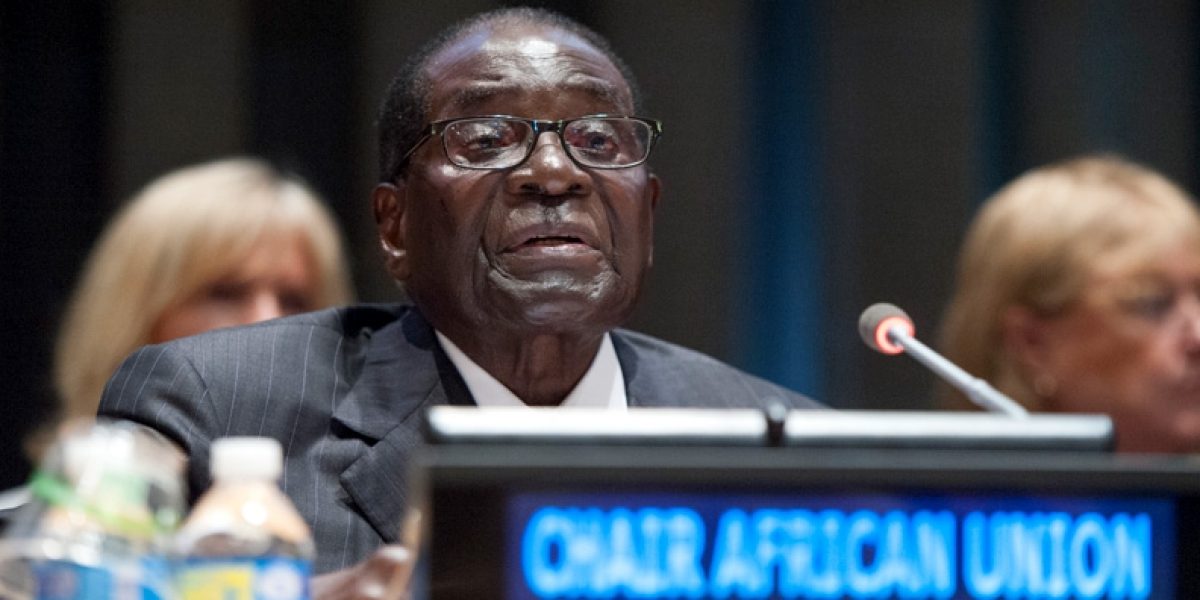At 92, Mugabe is the oldest president in the world, bearing ironic comparisons to the gods of Ancient Greece. Like Zeus, who refused to share power with his siblings, Mugabe is unlikely to step down anytime soon.
However, while he is the oldest, he is not the longest-serving head of state in Africa. Teodoro Obiang of Equatorial Guinea and Jose Eduardo dos Santos of Angola, have both been in power for 36 years, one year longer than him. At last month’s African Union (AU) Summit, the issue of extending term-limits – a major threat to stability on the continent – was once again given a backseat.
Some African leaders have taken the international community’s desire for stability and continuity as a sign that they need to stay in power indefinitely. Constitutional manipulations are the most common method for prolonging presidential term-limits.
Simply ignoring them works too, as exemplified by Eritrea’s Isaias Afwerki, who remains in power after over 22 years and most recently in the Gambia when former president Yayha Jammeh refused to step down following the results of the 2016 elections; ECOWAS had to intimidate and send troops to the nation’s coast to persuade the former leader to stand down.
In 2015, Burundian President Pierre Nkurunziza ran for a third term despite the two term-limit set by the constitution and at the same time violated the Arusha Accords. This led to mass protests, an attempted coup, armed uprisings and a brutal crackdown.
Rwanda’s Paul Kagame is seeking a third term in 2017 following constitutional changes. He has been in power since 2000 and could now, in theory, serve until 2034.
In November 2014 in Burkina Faso, Blaise Compaore was forced to resign after his plans to extend his 27 year rule were met with fierce protests.
In 2015, the president of Benin expressed the intention to change term limits, while his DRC counterpart continually finds ways of prolonging his rule.
Some argue, however, that these leaders have brought major improvements in their countries which have been overlooked. In Rwanda, Kagame is praised for reviving the country after the devastating 1994 genocide. Rwanda is seen as a model for economic development in Africa (its GDP grew by 8.1% from 2014 to 2015) and is ranked in first place globally with a majority of women in parliament. According to UNICEF, Rwanda also has the highest primary school enrolment rate (96.5%) in Africa.
However, Kagame’s rule has been clouded with allegations of human rights violations and lack of political freedom.
Despite the increase in constitutional amendments for term elongation on the continent, presidents who respect term limits do exist. Some African rulers who quietly left office after their allotted maximum terms – Joaquim Chissano (Mozambique), Festus Mogae (Botswana), Pedro Pires (Cabo Verde) and Hifikepunye Pohamba (Namibia) – and left their countries in a better state than they found them, were all awarded the Mo Ibrahim Prize for Achievement in African Leadership. Some other long-incumbent rulers, such as President dos Santos (Angola) and President Omar al Bashir (Sudan), announced plans to step down in 2017 and 2020 respectively.
While welcome, will these pledges be honoured?
The AU, now more than ever, should be at the forefront of dealing with leaders who refuse to relinquish power. Although it suspended Egypt (2013) following demonstrations in support of ousted president Mohammed Morsi, it has been largely silent and ineffective at handling the constitutional crises erupting across the region. On December 2015 in Burundi the AU Peace and Security Commission (PSC) authorised a 5,000-strong protection force. The Commission then invoked Article 4(h) of the AU Constitutive Act, which allows the AU to intervene in a member state in cases of war crimes, genocide and crimes against humanity. However, some African leaders refused to endorse this mission, which scuppered it and highlighted internal tensions.
No person on the continent should be viewed as immortal by their peers or indeed by themselves. Leaders need to respect their constitutions and see amendments to prolong power as infringements of democratic principles. Africa cannot build democratic countries without democratic leaders and constitutions which are upheld by all, with leaders that are held accountable.
According to Afrobarometer, 67% percent of Africans prefer democracy to any other political system. Public demand for democracy is therefore high and leaders need to promote and protect democratic gains in their respective countries.
In addition, African heads of state should encourage their peers not to extend their terms in office and foster a tradition of regular free and fair elections. However, many of them are not interested in changing the status quo due to their own abuses of power.
Governance of a nation should never be reduced to an individual. Constitutional term limits are a tool that helps to ensure the periodic turn-over of power. When disregarded, there is an increased risk of the emergence of electoral dictatorships or incumbents becoming pseudo-monarchs. The constitution should always be respected to safeguard against autocracy.








